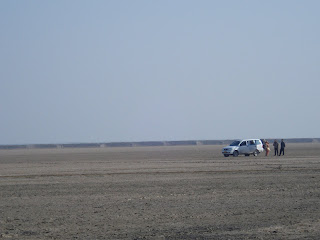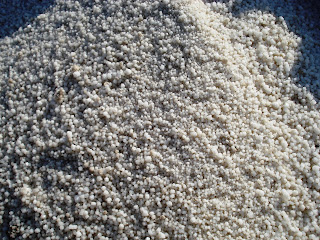 I recently traveled to the heartland of the US - Wichita Kansas to be precise. Its one of the larger cities in the mid west which I guess, thanks to its past history of industrial prosperity, still maintains a sense of dignity and purpose in an otherwise list of places which are slowly becoming increasingly insignificant corners of the world.
I recently traveled to the heartland of the US - Wichita Kansas to be precise. Its one of the larger cities in the mid west which I guess, thanks to its past history of industrial prosperity, still maintains a sense of dignity and purpose in an otherwise list of places which are slowly becoming increasingly insignificant corners of the world.Flying @ 40000 ft,as we began our desent in to Mid Continental Airport, Wichita the thought that came to me instantly was poetic - 'how lovely the snow looks!! Like the whole ground is covered by a spotless white soft carpet as far as the eye can see. Rivulets, hills, valleys, roads, trees all covered with the same uniform coat of purity.' Snow - its a great leveler, I thought. Treats everyone and everything equal.
But the moment I stepped out of the aircraft, the poet in me died an instant death. I was hit with the 'cold' reality of how cold it really was. Note to self - technology can tell you what the temprature is in any corner of the world at any time of the day - present or future. But it cannot tell you how COLD it is. That, one needs to experience himself.
Before leaving sunny California, I had checked the weather in Wichita on multiple weather sites . channels / newspapers - and all of them had confirmed it to be in the range of 7 F to 20 F. I was unmoved. I had been to Germany in the early months of January, had trekked at the Rohtang Pass in India, how bad could this be. Well I was about to find out.
The ride from the airport to my workplace was particularly interesting. I found out that the two minute walk from the temprature controlled airport to the rental car in the open lot was enough to chill my blood and give me an instant headache like never before. I would feel the my innards screaming as I fumbled with the keys to unlock the car. And the car, oh the car - it was like sloshed ice flowing slowly through my veins as soon as I sat in it (talk about being COLD BLOODED). It was around then - about 10 mins into my stay in Wichita I knew, if I was to survive this, I would need the works - skull caps, pairs of gloves, thermals (all in plural) and a lot of rum (not necessarily in that order).
Cut to day 2 - after having borne the brunt of day 1, I was much better prepared for day 2 with the 'works' (or so I thought). It was a deceptivly bright and sunny day. As I walked out to the parking lot of the hotel I saw the car covered with ICE (not SNOW, Ice). The windscreen, the windows, the fenders et al. And Ice unlike the nice fluffy snow STICKS. That's about when I understood the purpose of the large wooded scrub brush in the trunk of my car. I started with a jolly tune of an old nursery rhyme in mind ('This is the way we brush our teeth, brush our teeth, brush our teeth' tune) going 'This is the way we scrape the ice, scrape the ice, scrape the ice'. 2 minutes into this and all my extremities began to freeze and the tune was all but lost in the chatter of my teeth. And that was the end of that. I am not sure how long I scraped the ice - but sure enough I was traumatized and permenantly scarred for life by the time I got in the car. Now I know why folks there turn on their cars and go for a coffee !!!
The last incident which comes to my mind my encounter with a phenomenon called 'Black Ice'. Black ice are thin invisible layers of ice that form roads and pavements when temprature falls way below the freezing point of ice. The biggest problem is that being transperant one cannot see it on the road and that when you start truly believeing in Newtons 1st Law - 'An object in motion stays in motion with the same speed and direction unless acted upon by an unbalanced force.' Thats exactly what happens to cars when they drive on black ice. No amount of breaking works and fortunately for me I found out about this in the hotel parking lot. A low pavement had to break my car movement when I was driving out to get some dinner. Needless to say - I parked the car back in its slot and had a microwave dinner in the hotel itself. As they say - Discretion is the better part of valour.
Having experienced such extreme harsh weather first hand my respect for the folks who live in such and even colder parts of the world has increased by leaps and bounds. Hats off folks .. and skull caps on :D :D ...



